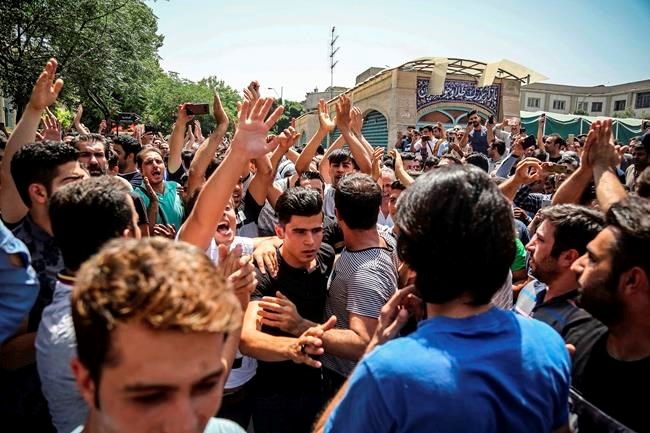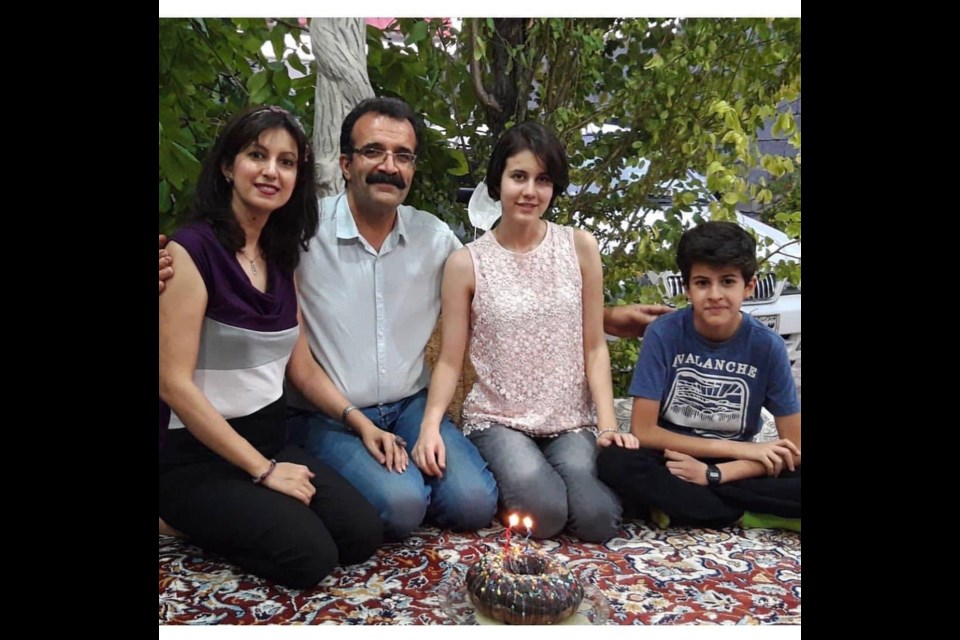A Coquitlam woman who said her brother has been arbitrarily arrested and imprisoned by Iran’s intelligence agents is calling on the Canadian government to put pressure on the country at a time COVID-19 cases are on the rise.
Soheila Talebi-Eskandari has lived in Coquitlam since 1993, arriving in Canada as a 17-year-old refugee after she fled Iran and its Islamic revolutionary government after it began to crack down on the Bahá’í religious community in the early 1990s.
But where Talebi-Eskandari left, her parents, brother and sister stayed behind — her father eventually getting arrested, put on death row and eventually serving a 10-year prison term for sitting on a local Bahá’í council as the government purged the religious group from public office, the civil service and higher education.
The Bahá’í religion grew in an area of what’s now Iran in the late 19th century. Despite preaching spiritual unity among the world’s religions, its adherents — which are estimated to total up to eight million globally — have been subject to various rounds of persecution since its inception.
Nearly two decades after Soheila fled Iran, her brother, Houshmand Talebi, and his family have inherited that same harassment and persecution. Barred from university, Talebi found work distributing shampoo and soap to local stores with his pickup truck, according to his sister.
Still, every few years, security and intelligence officers raid the house and confiscate everything important to them, like cell phones, iPads, computers, books and pictures, according to the family.
“A few times they’ve asked him: Why don’t you leave the country?” said Soheila.
Then, in August, the brother and his wife, Mojdeh Eghterafi, got a call from officials telling them to retrieve some of their stolen belongings. But when they arrived at the warehouse, both were arrested. Soheila said five guards accompanied her brother back to the house to raid it again, this time taking the truck, the brother’s only means of survival.
“They even took an acoustic piano my niece would play,” said Soheila, who suspects it was because her 15-year-old Nawal Talebi maintained a public Instagram account where she would share her music. “It reminds me of an armed robbery but you have the permission of the Supreme Leader.”
“This is how they live. They always follow the laws, but the government doesn’t even give them their basic civil rights.”
Her sister, who lives in the western city of Isfahan with the rest of the family, rushed to collect the couple’s two teenage kids as they were once again hauled away.
Since then, the family has been racked with anxiety, only allowed two 20-minute visits with the imprisoned couple and most recently told a government lawyer would be provided to them.
“You cannot speak freely,” said Soheila of the prison visits, adding they still don’t know what they’re being charged with. “He said my migraines are back. He doesn’t have migraines. We just guess, they’re hurting him, doing something to him. That’s all he could say.”
The families’ anxiety was made all the worse when on Sept. 12, the Iranian government executed a champion wrestler accused of stabbing a man in a case the wrestler’s family says was used to target the man after he participated in protests against Iran’s Shiite theocracy in 2018.

It’s not just threats of violence that keeps the family on edge every night.
While COVID-19 cases reach new daily highs across Iran, inside Iran’s prisons, calls to respond to the virus appears to have fallen on deaf ears.
According to leaked letters obtained by Amnesty International and published at the end of July, Iran’s ministry of health failed to respond to senior officials running the country’s prisons after they repeatedly raised the alarm over shortages in personal protective equipment, disinfectant and ventilation systems, in addition to other medical devices like thermometers and components to help intubate patients.
“Lately, in the last few months, there’s been lots of arrests in Isfahan,” said Soheila, worried the government is throwing people in prison to purposely infect them.
“If they get the disease, it’s a better way because they don’t have to answer to anybody. It’s convenient for the government.”
As the imprisonment of her brother and sister-in-law drags on, Soheila along with family in Iran and Australia, are working together to find any avenue they can to put pressure on the Iranian regime and are preparing to submit a summary of the case to Amnesty International in the coming days.
In response to questions from the Tri-City News, a spokesperson from the Ministry of Global Affairs said that it is monitoring the human rights situation in Iran closely, that the Canadian government “remains deeply concerned by the Iranian government’s unrelenting targeting and arbitrary arrest of the Bahá’i" and that it "urges Iran to ensure the immediate and safe release of these prisoners.”
The Coquitlam sister has also been in touch with Coquitlam-Port Coquitlam MP Ron McKinnon’s office to raise the case to the federal government in hopes it will put pressure on Iran’s government.
“We are following this case closely and I will continue to work with my constituent,” McKinnon told the Tri-City News in a written statement. “Canada will always stand up for freedom of religion and human rights.”
In the meantime, Soheila can do nothing but wait.
“I’m just waiting to see when they’re going to call me,” she said.
“I’m just going crazy.”



